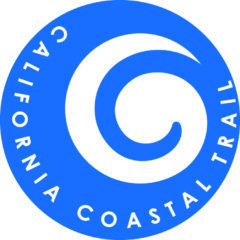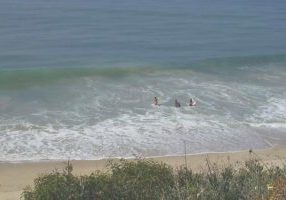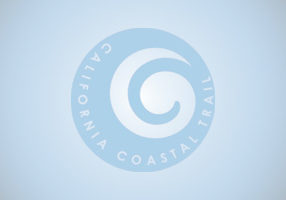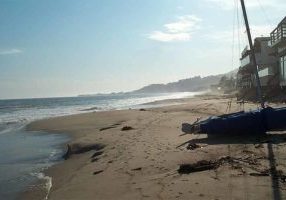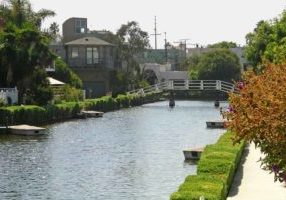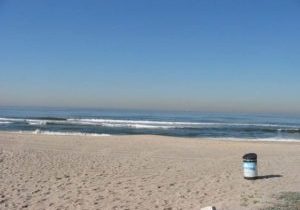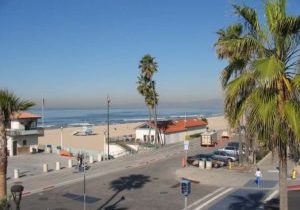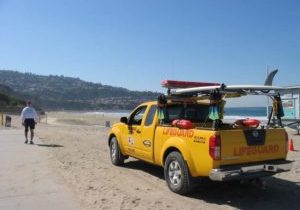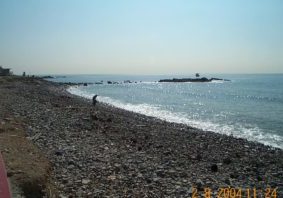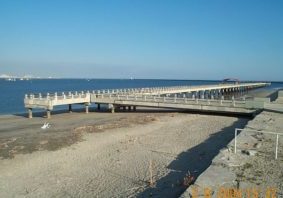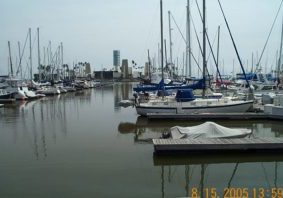MILLIONS OF PEOPLE HAVE SETTLED in the southern California region for its great weather, endless outdoor recreation opportunities and wonderful scenery. Los Angeles County and vicinity boast spectacular snow capped, forested mountain ranges, vast scenic deserts, and a sparkling coastline rimmed by mountains in the north and backed by a level plain in the south. The L.A. coast has great scenery, fascinating history, warm water to swim in, remoteness if you walk for it, and mile upon mile of public beaches for sunbathing, swimming, fishing, beachcombing, and hiking. The more than 65 million visits locals and tourists make annually attest to the popularity of the beaches. To some people Los Angeles County conjures images of endless subdivisions, clogged freeways and smog-filled air. While L.A. does have its problems, most of them are left behind when people head for the coast, where most of the beaches are fun, remarkably safe and easily accessible.
In the county's northwest, the Santa Monica Mountains National Recreation Area not only provides a dramatic backdrop to the westernmost coast, but also offers the 64-mile Backbone Trail, a wilderness ridgetop alternative to the coast route (see Ventura County Section 6A). In the south, the Palos Verdes Peninsula is like an island separated from the city by steep terrain and strict development restrictions. It offers the 26-mile Palos Verdes Loop Trail through hidden canyons with vistas of ocean, coast, harbor and city.
Los Angeles County also boasts Catalina Island, with a partially intact southern California ecosystem, 26 miles off the coast. The Santa Catalina Island Conservancy protects 86% of the 76 square miles in a semi-wilderness condition, permitting public access to beaches, trails and campgrounds. Boats depart daily from Long Beach and San Pedro in Los Angeles County and from Newport Beach and Dana Point in Orange County for the two-hour crossing.
The California Coastal Trail in Los Angeles County starts at the Ventura County border a little west of Leo Carrillo State Beach, then skirts the base of the Santa Monica Mountains along the famous Malibu coast, the wildest part of the county's coast, winding on and off beaches and streets and even under houses built on the sand, before hitting the paved South Bay Trail and the beaches of Santa Monica Bay. The CCT passes unique beach towns such as Venice and Manhattan Beach, several marinas and four piers before reaching the Pals Verdes Peninsula.
On the mountainous Palos Verdes Peninsula, the trail follows the mostly rocky tideline at the base of steep, dramatic cliffs, then follows streets and winds through parks. At the southern end of the peninsula, San Pedro overlooks the vast Long Beach and Los Angeles ports that fill the sheltered harbor. After a walk through Point Fermin Park with its historic lighthouse and a look at the Cabrillo Marine Museum, the route circles the vast Los Angeles/Long Beach Harbor complex before reaching downtown Long Beach. If you arrange a boat ride from Ports O'Call Village in San Pedro to the city of Long Beach, you can avoid that long industrial leg. The last part of the walk traverses the long beach after which the city is so aptly named, then circles around Naples Marina before arriving at the San Gabriel River and Orange County.


